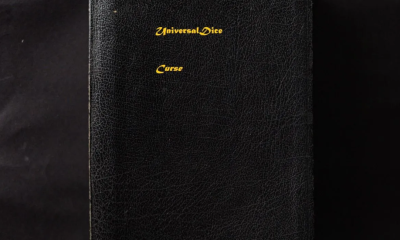Album Review
Stephanie Bettman’s Latest Single “Beautiful Day”

You don’t have to be the biggest folk-rock fan around to appreciate the depth of emotionality in Stephanie Bettman’s new solo single “Beautiful Day,” as its plethora of melodies give us everything that listeners need to know in its running time. Like the other songs found in her growing discography, “Beautiful Day” sees Bettman experimenting with palatable pop sounds, blending influences from the folk spectrum whilst providing us with a familiar rhythm that doesn’t get flimsy by the second stanza. It’s among the more straightforward singles that I’ve heard in the last month, but if you’ve got an ear for toned songcraft, you’d be seriously pressed to find another track like this one.
The instrumentation is telling us a story all its own in “Beautiful Day,” and I think that, were it not presented in such high-definition clarity, this single probably wouldn’t be as engaging as it is in this form. Bettman is a very talented singer, but the soundscape that she uses as a sonic canvas to apply her acrylic vocal textures is quintessential to getting her point across here. There’s something to be said about the players that she’s gathered together for her backing band, and I hope that they continue to work together as she creates a full-length album with this song’s emotive template at the foundation of every composition. There’s a wholesomeness here you don’t find very often anymore, and I want to hear what it can produce with more creative breathing room.
I am more than curious about what Stephanie Bettman would sound like in a live setting after hearing “Beautiful Day.” She’s got a fetching and rather approachable charisma in this song, and in many ways employs her microphone as a gateway into the storied past of 70s singer/songwriters. Bettman channels a lot of Joni and Melanie here, but even though she’s wearing her influences on her sleeve, her stylish musical persona isn’t rooted in the throwback/retro culture that has gotten a little tiresome in the last few years. It’s one thing to be inspired, but unlike some of the artists making big mainstream gains this spring, this is one singer who isn’t looking to live her life in a time machine.
I haven’t been able to put this song down since I first picked it up, and once you give “Beautiful Day” the chance to sink its hooks into your chest, I think that you’ll share my sentiments. It’s an intoxicating meld of old and new, both retro and surprisingly modern where it matters the most, and even taking into consideration its nonconformist design, it’s still more accessible than the more commercial folk/pop that you might have come across this season. Stephanie Bettman’s career is picking up a healthy amount of steam at the moment, and if this song gets into steady rotation on the college radio airwaves this summer, it’s going to be a lot harder for her competitors in the American underground to keep up with her momentum heading into the latter half of 2024.
Gwen Waggoner
Album Review
Big O redefines artistic evolution with “When it’s Not Said, But Done” album

Big O’s “When it’s Not Said, But Done” is a whisper of transformation narrated through rhythm, texture, and space. Across its fifteen tracks, spanning just under forty-seven minutes, Big O sacrifices flash for feeling and ego for essence.
The production feels like an artist who has finally quit chasing something external and is instead listening inward. The flow of the album is methodical but organic, with each track leading into the other as if they were diary entries. On “Free Spirit,” Big O creates a soundscape that embodies freedom in action, with rhythms that propel you forward. It’s one of those rare songs that can be at once contemplative and propulsive, with a slow revelation. And also, “New Found Joy” is an anthem for rebirth.
Big O’s production vision here is sweeping and cinematic, but also intimate. The presence of live musicians gives an organic texture. Jeronimo G’s xylophone on track nine tolls like an intimate conversation, while IB Delight’s saxophone on track ten blows satisfying warmth and longing into the mix. These collaborative moments are the crucial parts of Big O’s unfolding language.
Every choice, from the minimal artwork by Andriyan Robby to the in-house mixing and mastering by Big O himself, is consistent with the album’s spirit of transformational thought. In “When it’s Not Said, But Done,” Big O has created a statement on silent courage. It is an album for those who know that, in reality, real change does not need to be shouted from the mountaintops, but only heard, felt, and lived.
Album Review
W.C. Beck delivers a balance of stillness and introspection on ”A Mostly Quiet Life”

Singer-songwriter W.C. Beck has long been admired for his reflective storytelling and innovative approach that transcends traditional musical genres. His latest album, “A Mostly Quiet Life,” invites you into a realm where quiet moments possess considerable significance. The album spans slightly over 35 minutes and comprises eight tracks, offering a delicate yet bold exploration of life’s softer spaces, infused with subtle rock undertones amidst Beck’s signature mellow vocal style.
At first listen, two tracks prominently establish the thematic duality of the album: “Every Drop of Water” and “Blue Umbrella.” The former features a slow-burning intensity, built around subtle guitar textures and Beck’s emotive vocal delivery. It captures the essence of meditation, reminding us that even the smallest gestures and overlooked moments shape who we are. Conversely, “Blue Umbrella” introduces a different shade of his artistry, filled with wistful imagery and an almost cinematic essence, blending melancholy with underlying hope.
While firmly rooted in folk traditions, Beck incorporates elements of Americana, indie-rock, and singer-songwriter balladry, resulting in a sound that feels both timeless and uniquely his own. Unlike many records that tend to emphasize either softness or grit, Beck creates an atmosphere where both can coexist, allowing for reflection without losing momentum. With this release, W.C. Beck not only strengthens his reputation as a master storyteller but also reminds us that even in a fast-paced world, there is profound power in living quietly.
The album fosters introspection by exploring themes of solitude, ephemeral love, and the beauty that can be found in stillness. It transcends the notion of a collection of songs and is more akin to a journal, a quiet yet deeply expressive chapter in Beck’s musical journey. “A Mostly Quiet Life” serves as a compelling offering, ideally suited for late-night listening or those moments when life slows down enough to be genuinely appreciated. Beck illustrates that quiet doesn’t equate to stagnation; rather, it is within these hushed intervals that music can resonate most powerfully.
For more information about W.C. Beck, please visit [website].
CLICK HERE TO STREAM W.C. Beck’s ”A Mostly Quiet Life’‘ on Spotify.
CONNECT WITH W.C. Beck |Instagram | Facebook |
-

 Artist Spotlight7 days ago
Artist Spotlight7 days agoLisa Boostani creates a mesmerizing tidal realm in “Ocean”
-

 Artist Spotlight7 days ago
Artist Spotlight7 days agoNinjahtiger & Jahlnt make a “Wish” into the universe with new single
-

 Artist Spotlight7 days ago
Artist Spotlight7 days agoNOAH. captures the unspoken signals in enchanting R&B track “That’s Bless”
-

 Artist Spotlight7 days ago
Artist Spotlight7 days agoEylsia Nicolas ascends again with new release “I Remember Rising”
-

 Artist Spotlight7 days ago
Artist Spotlight7 days agoIOTA opens the truest form of self in captivating new single “Pony”
-

 Artist Spotlight7 days ago
Artist Spotlight7 days agoBARELSKI redefines mood with electronic single “Never Enough”
-

 Artist Spotlight7 days ago
Artist Spotlight7 days agoAneta George shows both heavenly energy and human tension in “Rollercoaster”
-

 Artist Spotlight7 days ago
Artist Spotlight7 days agoBenjamin Navy explores intimacy, healing, and cultural memory in “Mango Avocado”













